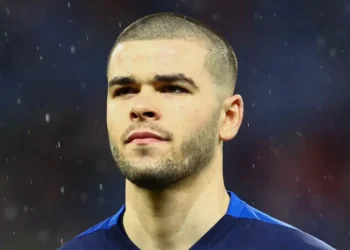In a decision that has stunned many across the footballing world, FIFA has imposed a three-transfer window ban on Olympique Lyonnais due to an unpaid €2,000 debt to agents — an amount that star striker Alexandre Lacazette reportedly earned in just 3.5 hours last season. While the punishment might seem disproportionately severe given the trivial size of the debt, it is a striking example of the inflexible administrative rules in modern football and the surprising financial mismanagement even among top-tier European clubs.
Olympique Lyonnais, a historically prestigious French club known for its youth academy and competitive European runs in the early 2000s, has faced turbulent financial years. The club has struggled on the pitch, barely qualifying for European competitions recently, and now off-pitch decisions have further hampered their ability to compete. A €2,000 debt — a sum that would be negligible for most professional clubs — has snowballed into a crisis that may impact Lyon’s medium-term competitiveness.
The debt in question reportedly stems from agent fees related to a previous player transfer. FIFA’s Dispute Resolution Chamber, responsible for overseeing such cases, ruled in favor of the agent and gave Lyon a deadline to pay. After the deadline passed with no payment, FIFA activated one of its most severe penalties: a three-window transfer ban. This effectively means Lyon cannot register new players until mid-2026, unless the ban is lifted upon repayment and successful appeal.
The symbolic weight of this punishment has not been lost on fans and commentators. The headline-grabbing comparison — that Lacazette, one of Lyon’s highest earners, made the equivalent of the unpaid fee in just over three hours — underscores a disconnect between the financial realities of players and the administrative failings of club management. Lacazette’s salary reportedly exceeded €4 million annually, which breaks down to around €11,000 per day — or roughly €458 per hour — making the €2,000 debt a laughably small amount in relative terms.
And yet, it’s not the amount, but the principle. FIFA’s regulations are designed to ensure that agents and intermediaries — often marginalized in the grand scheme of player transactions — receive what they are contractually owed. Regardless of whether the debt is €2,000 or €2 million, the system functions on strict compliance. Failing to uphold even minor obligations sends a signal of administrative incompetence or negligence, something FIFA seeks to deter across the board.
Lyon’s predicament also reveals deeper structural issues in football club management. That a club of Lyon’s stature and resources could either forget, delay, or willfully ignore a basic financial obligation reflects poorly on its internal operations. Critics argue this kind of oversight is a symptom of broader financial instability and confusion in the post-pandemic era, where many clubs are still recovering from the loss of matchday revenues and inflated wage bills.
Reactions from fans have ranged from disbelief to outrage. Many have taken to social media to mock the club’s hierarchy, calling it “amateur hour” and labeling the ban “a self-inflicted wound.” Others see it as an opportunity for young talent to emerge, as the club may be forced to rely on academy players and free transfers if the ban is not overturned.
There is still a narrow path forward for Lyon. The club can appeal the decision to the Court of Arbitration for Sport (CAS), and if the debt is paid in full — along with any interest or penalties — FIFA may lift the ban before all three windows pass. However, such processes take time, and the delay may already disrupt summer transfer plans.
In broader terms, this situation serves as a cautionary tale for other clubs. In an era where millions are spent on transfers and salaries, the failure to resolve a debt worth less than the price of a luxury watch has triggered a potentially season-defining consequence. The modern game, as global and glamorous as it has become, still relies on a foundation of legal and financial discipline.
Ultimately, Lyon’s embarrassment is a reminder that in football, reputation and regulatory compliance are just as important as talent on the pitch. If the club hopes to restore its competitive edge and credibility, addressing internal governance must be as high a priority as any marquee signing — assuming they’ll be a
llowed to make one.











